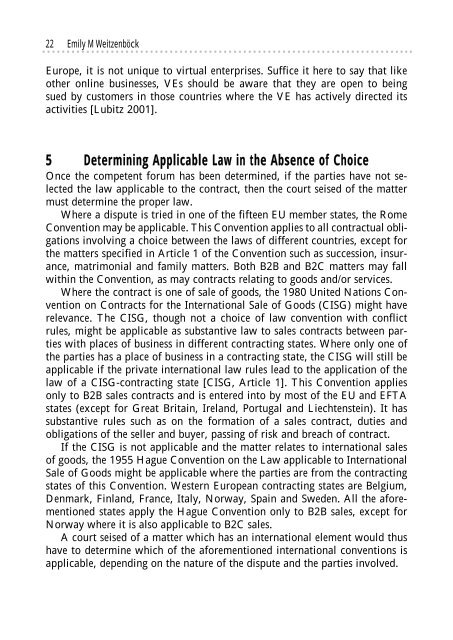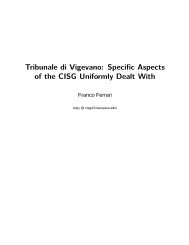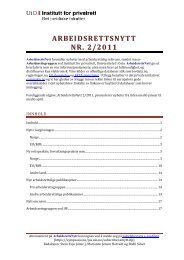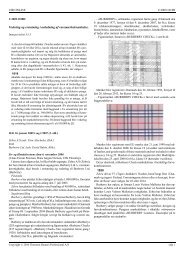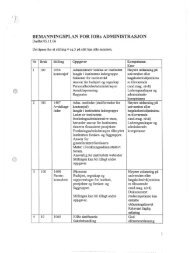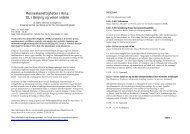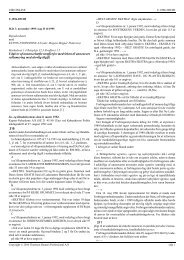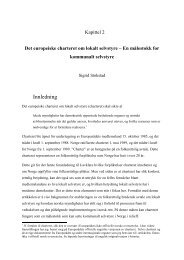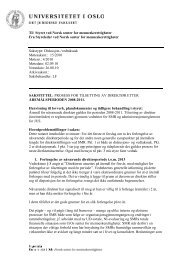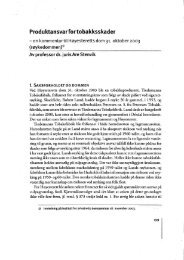Lee A. Bygrave (red.) YULEX 2002 - Universitetet i Oslo
Lee A. Bygrave (red.) YULEX 2002 - Universitetet i Oslo
Lee A. Bygrave (red.) YULEX 2002 - Universitetet i Oslo
Create successful ePaper yourself
Turn your PDF publications into a flip-book with our unique Google optimized e-Paper software.
............................................................................<br />
22 Emily M Weitzenböck<br />
Europe, it is not unique to virtual enterprises. Suffice it here to say that like<br />
other online businesses, VEs should be aware that they are open to being<br />
sued by customers in those countries where the VE has actively directed its<br />
activities [Lubitz 2001].<br />
5 Determining Applicable Law in the Absence of Choice<br />
Once the competent forum has been determined, if the parties have not selected<br />
the law applicable to the contract, then the court seised of the matter<br />
must determine the proper law.<br />
Where a dispute is tried in one of the fifteen EU member states, the Rome<br />
Convention may be applicable. This Convention applies to all contractual obligations<br />
involving a choice between the laws of different countries, except for<br />
the matters specified in Article 1 of the Convention such as succession, insurance,<br />
matrimonial and family matters. Both B2B and B2C matters may fall<br />
within the Convention, as may contracts relating to goods and/or services.<br />
Where the contract is one of sale of goods, the 1980 United Nations Convention<br />
on Contracts for the International Sale of Goods (CISG) might have<br />
relevance. The CISG, though not a choice of law convention with conflict<br />
rules, might be applicable as substantive law to sales contracts between parties<br />
with places of business in different contracting states. Where only one of<br />
the parties has a place of business in a contracting state, the CISG will still be<br />
applicable if the private international law rules lead to the application of the<br />
law of a CISG-contracting state [CISG, Article 1]. This Convention applies<br />
only to B2B sales contracts and is ente<strong>red</strong> into by most of the EU and EFTA<br />
states (except for Great Britain, Ireland, Portugal and Liechtenstein). It has<br />
substantive rules such as on the formation of a sales contract, duties and<br />
obligations of the seller and buyer, passing of risk and breach of contract.<br />
If the CISG is not applicable and the matter relates to international sales<br />
of goods, the 1955 Hague Convention on the Law applicable to International<br />
Sale of Goods might be applicable where the parties are from the contracting<br />
states of this Convention. Western European contracting states are Belgium,<br />
Denmark, Finland, France, Italy, Norway, Spain and Sweden. All the aforementioned<br />
states apply the Hague Convention only to B2B sales, except for<br />
Norway where it is also applicable to B2C sales.<br />
A court seised of a matter which has an international element would thus<br />
have to determine which of the aforementioned international conventions is<br />
applicable, depending on the nature of the dispute and the parties involved.


